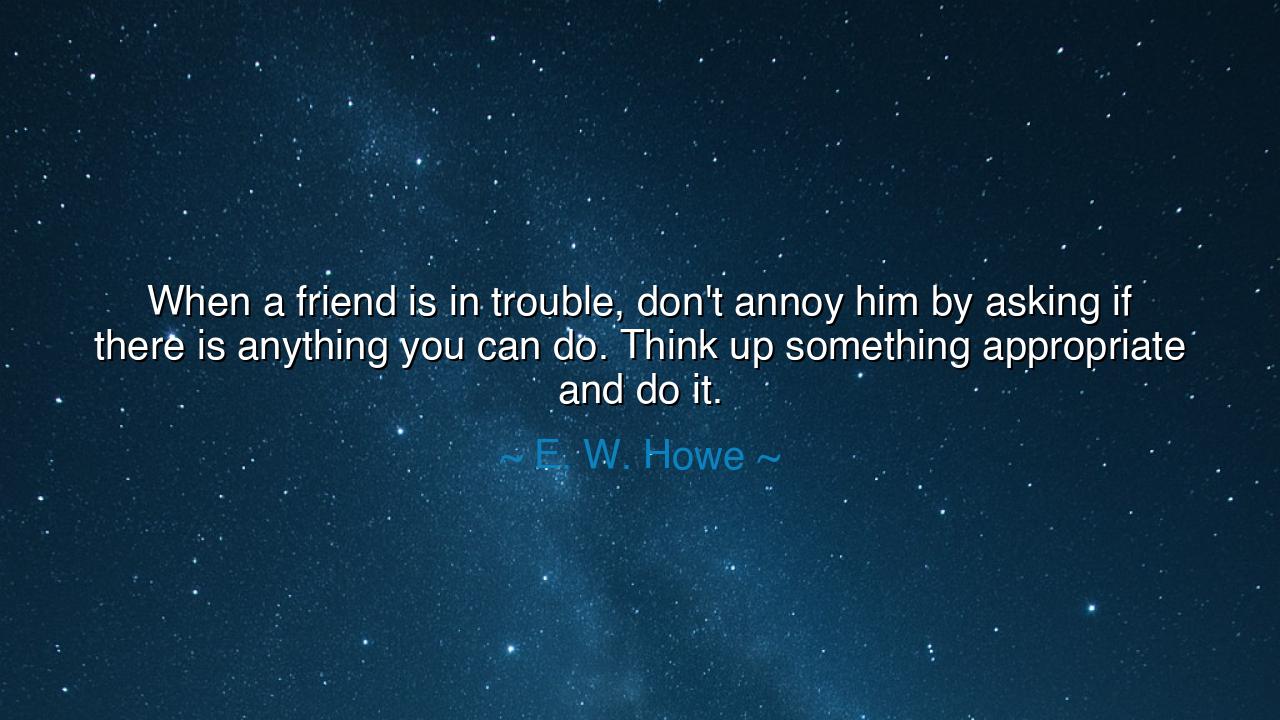
When a friend is in trouble, don't annoy him by asking if there
When a friend is in trouble, don't annoy him by asking if there is anything you can do. Think up something appropriate and do it.






“When a friend is in trouble, don’t annoy him by asking if there is anything you can do. Think up something appropriate and do it.”
Thus wrote E. W. Howe, the American novelist and moralist of the early twentieth century, whose plain speech often concealed profound truth. In this brief yet powerful counsel, Howe captures the essence of true friendship in action. He teaches that when a friend suffers, words alone are insufficient; sympathy must take form in deed, not in empty inquiry. To ask, “What can I do?” may seem kind, but often it shifts the burden of thought onto the one already weighed by sorrow. The truest friend does not wait for instruction—he acts from compassion and intuition, meeting need before it is voiced.
The origin of this wisdom lies in Howe’s lifelong observation of human behavior. Known for his wit and insight, he chronicled the manners and morals of ordinary people with uncommon clarity. He understood that many speak kindly but act little, mistaking words for care. Through his writings, Howe urged a more active morality, a love that shows itself through deeds. This quote, then, is not merely about friendship—it is a mirror of human responsibility. It reminds us that love is not passive, that to care for another is to move swiftly, quietly, and effectively in their aid.
The meaning of Howe’s saying runs deep into the heart of empathy. When a man or woman is in distress, their soul is weary, their mind burdened, and their voice unsure. To ask them to explain what they need is to ask the drowning to describe the current. The true friend, therefore, perceives without questioning. They read the unspoken signs—the trembling hand, the silent stare, the broken routine—and they act with wisdom born of love. Whether it is to offer food, comfort, presence, or protection, they bring what the moment demands, not what convention suggests. Howe’s wisdom is a call to attentiveness: to listen not only with the ear, but with the heart.
History offers countless examples of this truth. Consider the friendship of Jonathan and David in the days of ancient Israel. When David was hunted by King Saul and his life hung by a thread, Jonathan did not ask, “What can I do for you?”—he did what love required. He warned David of danger, provided him safety, and risked his father’s wrath for the sake of loyalty. His friendship was not measured in words but in sacrifice. He discerned his friend’s need and met it with courage. This is the heart of Howe’s teaching: that love requires no instruction manual, only sincerity of purpose and the will to act.
So too, in more recent times, we recall the story of Florence Nightingale, who during the Crimean War saw soldiers suffering in filth and neglect. She did not wait to be asked; she acted. She brought light, cleanliness, and compassion where there had been despair. Though her friends were not personal in the traditional sense, her friendship to humanity was no less real. She exemplified the spirit of Howe’s command: when others are in trouble, do not linger in words—find what is needed and do it. True friendship, whether between two people or between one soul and the world, is measured in what is done, not said.
Howe’s quote also warns us of the subtle vanity hidden in well-meaning questions. To ask, “What can I do?” is often to seek reassurance of our goodness rather than to serve another’s need. It is comfort for the asker, not relief for the sufferer. True friendship, by contrast, forgets the self entirely. It does not seek thanks or acknowledgment, but simply moves toward the friend as a river moves toward the sea—naturally, unforced, inevitable. The great souls of every age—whether saints, heroes, or humble companions—understood this: that love acts before thought, and that duty born of affection does not wait for permission.
Let this, then, be the lesson for those who wish to walk the path of noble friendship. When your friend is sorrowful, do not ask them to name their need—see it, feel it, and meet it. If they are hungry, feed them; if they are weary, sit beside them; if they are lost, guide them quietly home. Often, what the suffering heart requires is not help spoken, but presence given. Words may soothe for a moment, but deeds heal for a lifetime. Be therefore a friend of action, not of questions; one whose loyalty is known by quiet deeds and whose love asks nothing in return.
Thus, the wisdom of E. W. Howe stands as a timeless beacon of practical compassion: “When a friend is in trouble, don’t annoy him by asking if there is anything you can do. Think up something appropriate and do it.” For friendship is not proven in sympathy alone but in the instinct of care that moves without command. It is the highest form of love—not loud, but luminous; not spoken, but shown. And he who lives by this truth will find that in helping others without being asked, he has not only comforted a friend, but also ennobled his own soul.






AAdministratorAdministrator
Welcome, honored guests. Please leave a comment, we will respond soon